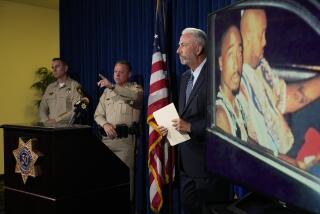Skakel Gets 20 Years to Life in 1975 Murder of Teen Neighbor
NEW YORK — A Connecticut judge sentenced Michael Skakel to 20 years to life in prison on Thursday for murdering his 15-year-old neighbor in 1975, rejecting a rambling, emotional claim of innocence by Skakel and a handwritten plea for leniency from his aunt, Ethel Skakel Kennedy.
Skakel, 41, was convicted in June of fatally bludgeoning and stabbing Martha Moxley with a broken golf club in their elite Greenwich, Conn., neighborhood. Skakel also was 15 at the time of the slaying, which confounded police for decades and prompted claims that the Kennedy clan’s influence had thwarted investigators.
“I would love to be able to say I did the crime so that the Moxley family could have peace,” Skakel said in state Superior Court in Norwalk, Conn., taking the stand for the first time. “But to do that would be a lie.” He said he prays for the Moxleys every night.
Moxley’s body was discovered on Halloween in 1975 under a tree on her family’s property. She had been beaten so savagely that the golf club had broken into three pieces. She also had been stabbed in the neck with the club’s shaft.
Judge John F. Kavanewsky Jr. had to follow sentencing guidelines in effect at the time of the killing. Skakel faced a minimum sentence of 10 years and a maximum of 25 years to life. By choosing the 20-year sentence, Kavanewsky ensured that Skakel would have to serve at least 11 1/2 years before becoming eligible for parole.
Kavanewsky said Thursday that he was handing Skakel a “more substantial sentence” because “for the past 25 years or more ... the defendant has been living a lie about his guilt. The defendant has accepted no responsibility, he has expressed no personal remorse.” The judge also denied Skakel bail pending an appeal, saying that the defendant is “more of a flight risk than ever.”
Moxley’s mother, Dorthy, stood under her son John’s umbrella in a light rain after the hearing and said she thought that the sentence was “very reasonable” but that she had hoped to hear Skakel apologize.
“He didn’t say he was sorry to us,” she said. “I have no doubt that he’s the one who killed Martha.”
The two-day sentencing hearing was a pained appraisal of what the Moxleys had lost in the death of their daughter compared with what Skakel had contributed in the 27 years since the murder occurred. On Thursday, as Skakel approached the lectern to testify for the first time, the courtroom was silent except for the clanking of his leg irons and a sniffle from one of his relatives.
In an expansive, often religious statement, he talked about “choosing God’s way” in 1985 and devoting his life to helping others overcome alcohol and drug addictions after he beat his own. He wept while he recalled trying to explain to his 3-year-old son, George, that “Daddy was not a bad man.”
He spoke of his sense of injustice. “I go to bed and I scream, ‘God, I’ve done everything you’ve asked; why are you doing this to me?’ ”
Prosecutors charged that the Skakels’ stature and connection to the Kennedys had prevented a thorough investigation in 1975 and continued to influence proceedings. On Thursday, the judge was presented with a handwritten note from Ethel Skakel Kennedy, the widow of Robert F. Kennedy. “With a heavy heart but with a hope born of the morning sun,” it said, “I write to ask that your compassion tip the scales in your decision regarding my nephew.”
On Wednesday, Skakel’s cousin, Robert F. Kennedy Jr., had submitted a longer letter, testifying to Skakel’s help in overcoming his substance abuse problems, and recounting Skakel’s maltreatment as a child by his father, nannies and classmates.
Dorthy Moxley made her own powerful statement in court Wednesday, saying that she was haunted by the knowledge that her young daughter died in pain and fear. “Michael Skakel sentenced us to life without Martha, so I think it’s fitting that he is sentenced to life without his little boy,” she said.
The sentencing puts an end to a case that went unsolved for decades. Early attention focused on Skakel’s older brother Thomas, who had been flirting with Martha and was the last person seen with her. Suspects also included a tutor who lived with the Skakels, Ken Littleton, and another neighbor.
Attention focused on Michael in the early 1990s after he changed the story he gave police about the night of the murder when he talked to private investigators hired in 1992 to clear the Skakels’ name. A series of high profile books, including examinations by Dominick Dunne and former Los Angeles Police Detective Mark Furhman, stoked additional interest in the case.
Skakel was arrested in 2000 after an investigation by a one-judge grand jury. He declared his innocence and lost a fight to have the case heard in juvenile court. The case was transferred to adult court in January 2001.
The conviction was unusual because it was not based on eyewitnesses or any physical evidence but on testimony from about a dozen witnesses, such as a family chauffeur who said Skakel was suicidal after the murder, and classmates at a Maine drug rehabilitation center who said he confessed.
One witness from the center, Gregory Coleman, had died of heroin use by the time Skakel’s trial began. But prosecutors were permitted to read Coleman’s pretrial testimony into the record, including an allegation that Skakel once told him: “I’m going to get away with murder, because I’m a Kennedy.”
More to Read
Sign up for Essential California
The most important California stories and recommendations in your inbox every morning.
You may occasionally receive promotional content from the Los Angeles Times.










